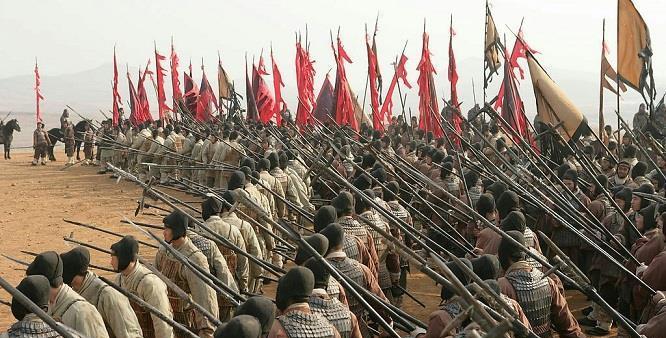
Looking back at China's ancient wars, we can find that those princes will compete for Jingzhou, Xiangyang and other so-called "places where soldiers must fight." Our country is so big, the city is dotted with places, why not pinch other soft persimmons first? Or, when encountering a "place where soldiers must fight", why don't these military experts play a careful role and take a detour to fight other cities first?
In fact, there have been successful examples of detour attacks in history, not to seize the "land that soldiers must fight", such as the Li Zicheng Uprising at the end of the Ming Dynasty, he is a strange flower in the history of our country, he is not interested in big cities, mainly to compete for some unknown cities and large areas of rural areas, through various shortcuts to detour, and finally entered the city of Beijing. Since there are successful cases in the past, why do the ancients still not like to use this method? I think the ancients had three considerations.
The key to victory in war lies in destroying the enemy's living forces and completely plunging them into the eighteenth layer of hell. In the era of cold weapons of sticks, knives and guns, although people are the protagonists of war, grain and grass equipment is the most important. As long as weapons, horses and food are preserved, they can be called back at any time. Just like Kong Ming went to the West City to keep grain and grass in the empty city plan, in ancient times, whether it was weapons, war horses, or grain, they were mainly hoarded in the city, that is, "the place where soldiers must fight". So these cities are both like a hard bone and a piece of fat on the side of the mouth. If you don't beat these cities down, it's like a nail that makes you unable to get the equipment and food to grow yourself, and you can't snuff out the capital of your opponent's comeback. So, in ancient warfare, even if you knew that attacking these places would cost you a lot, you would still flock to it, because the temptation was too great.
Second, the city of "the place where soldiers must fight" is also an ideal base for entrepreneurship. If you think about it, these places have been operated by your opponents for many years, if you beat it down, it will not only be a big loss for the other party, but also a big help for you, which can become your self-made entrepreneurial base and let you get a piece of paradise in this chaotic world. In ancient times, all those who did not have a base were called "liukou", and those who had this meal could not last long. In the ancient times of cold weapons, the most important base area was the city. Because the city is not only rich in grain and grass, so that you have a foothold in the capital, but also has a solid city defense, externally you can also be regarded as a hole card, internally and externally you are a big circle ahead of other rogues. It is not advisable to establish a base area on the mountain, just like Liangshan in the novel, your lifeblood has always been in the hands of others, and you cannot move if you are stuck, and you cannot develop without external affairs, and your external strength is not enough. And the "place where soldiers must fight" is the best choice for good appearance and practicality, with them you do not have those rules.
Third, the concept of "catching the thief before capturing the king" is implemented in the struggle of "the place where soldiers must fight". The concept of "catching the thief before capturing the king" expressed in Du Fu's poem is not his family's words, but a microcosm of China's domestic historical concept at that time. That is, when fighting a war, the army is aimed at "capturing the king", and then it can achieve the deterrent effect of killing people and condemning the heart, and in the art of war in all generations, it also pays attention to the attack on the heart. The "king" I am talking about here, from the army, is the leader of the army, this guy has been captured, can the small one below still struggle? From the perspective of the geographical strategy of the whole country, "the place where soldiers must fight" is the "king", and you have got this "king" right, that is, the overall situation has been determined, and the little brothers around you will obediently and automatically come to the door to attach themselves to you, so that your war will have an important node.
Now let's look back at the "Gulf War" and "Iraq War" launched by the United States, in which the US military tried and tested a trick - the beheading operation, which used to be felt to be a new type of WAR strategy of the United States, but now we find that in fact, we have already had it in ancient times. The concept of "a place where soldiers must fight" is actually a kind of "decapitation operation". When it becomes a reality, the leader of the region will fall, which will inevitably produce a huge deterrent force, and the surrounding small brother cities are often "overwhelmed" and fall at the feet of the newly superiors. Looking back at Li Zicheng now, I find that he was really stupid enough to go home, not to change his identity as a rogue, even if he was lucky enough to break into the city of Beijing, he could not avoid his fate of failure.